计算机发展史(英语版)11
- 格式:ppt
- 大小:4.13 MB
- 文档页数:17
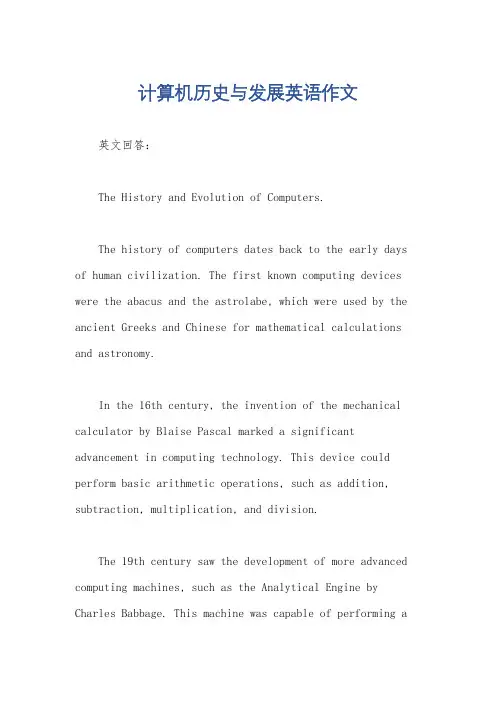
计算机历史与发展英语作文英文回答:The History and Evolution of Computers.The history of computers dates back to the early days of human civilization. The first known computing devices were the abacus and the astrolabe, which were used by the ancient Greeks and Chinese for mathematical calculations and astronomy.In the 16th century, the invention of the mechanical calculator by Blaise Pascal marked a significant advancement in computing technology. This device could perform basic arithmetic operations, such as addition, subtraction, multiplication, and division.The 19th century saw the development of more advanced computing machines, such as the Analytical Engine by Charles Babbage. This machine was capable of performing awide range of mathematical operations and is considered to be the first mechanical computer.In the 20th century, the invention of the electronic computer revolutionized the field of computing. The first electronic computer, the ENIAC (Electronic Numerical Integrator and Computer), was developed by John Atanasoff and Clifford Berry at the University of Pennsylvania in 1943.The ENIAC was a massive machine that weighed over 30 tons and contained over 18,000 vacuum tubes. It was capable of performing complex calculations at a speed of 5,000 operations per second.The development of transistors in the late 1940s and early 1950s led to the creation of smaller and more powerful computers. The first transistorized computer, the TX-0, was developed by MIT in 1956.The 1960s and 1970s saw the development of integrated circuits (ICs), which allowed multiple transistors to bepacked onto a single silicon chip. This advancement led to the creation of even smaller and more powerful computers.The 1980s saw the release of the first personal computers (PCs), which brought computing power toindividual users for the first time. The IBM PC, releasedin 1981, was a particularly influential model that popularized the PC concept.The 1990s and early 2000s saw the development of the World Wide Web and the Internet, which connected computers around the world and revolutionized the way people communicated and accessed information.The 21st century has seen the rise of mobile computing, cloud computing, and artificial intelligence (AI). Mobile devices, such as smartphones and tablets, have become ubiquitous, providing users with access to computing power and connectivity on the go.Cloud computing allows users to access and store data and applications over the Internet, rather than on theirown devices. This provides greater flexibility and scalability.AI is a field of computer science that focuses on developing intelligent systems that can perform tasks typically requiring human intelligence, such as learning, problem-solving, and decision-making.The development of computers has had a profound impact on society. Computers have revolutionized the way we work, communicate, learn, and access information. They have also played a major role in scientific research, engineering, medicine, and many other fields.As computing technology continues to evolve, it is likely to have an even greater impact on our lives in the years to come.中文回答:计算机的历史与发展。
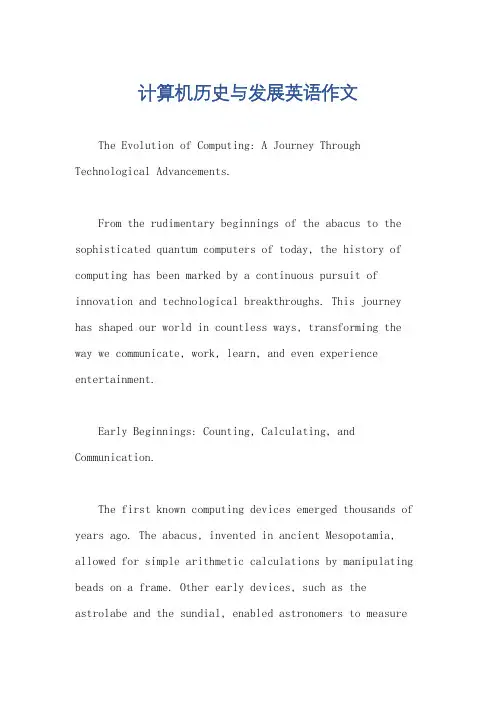
计算机历史与发展英语作文The Evolution of Computing: A Journey Through Technological Advancements.From the rudimentary beginnings of the abacus to the sophisticated quantum computers of today, the history of computing has been marked by a continuous pursuit of innovation and technological breakthroughs. This journey has shaped our world in countless ways, transforming the way we communicate, work, learn, and even experience entertainment.Early Beginnings: Counting, Calculating, and Communication.The first known computing devices emerged thousands of years ago. The abacus, invented in ancient Mesopotamia, allowed for simple arithmetic calculations by manipulating beads on a frame. Other early devices, such as the astrolabe and the sundial, enabled astronomers to measuretime and celestial phenomena.In the 17th century, the invention of the mechanical calculator, such as Blaise Pascal's Pascaline,revolutionized the process of arithmetic. These machines, using gears and levers, could perform complex calculations with greater speed and accuracy.A New Era of Electricity and Automation.The 19th century marked the dawn of the electrical age, which brought about significant advances in computing technology. In 1822, Charles Babbage proposed theAnalytical Engine, a mechanical computer that employedpunch cards for programming. Although never fully completed, Babbage's ideas laid the foundation for modern computers.In 1889, Herman Hollerith's development of the punched card for use in the 1890 US Census demonstrated thepotential of automated data processing. This invention ledto the establishment of the Tabulating Machine Company, which later became IBM.The Birth of the Electronic Computer.The 20th century witnessed the advent of electronic computers, which completely transformed the field of computing. In 1946, the ENIAC (Electronic Numerical Integrator and Computer) was built as a massive and complex machine to perform complex calculations for the US Army.Soon after, the University of Pennsylvania developedthe EDVAC (Electronic Discrete Variable Automatic Computer), which introduced the stored program concept,revolutionizing computer architecture. This idea allowed a single computer to perform multiple tasks by storing instructions in memory.The Transistor Revolution and Miniaturization.The invention of the transistor in 1947 marked apivotal moment in computing history. Transistors, replacing the bulky and unreliable vacuum tubes, were smaller, faster, and more energy-efficient. This breakthrough paved the wayfor the miniaturization of computers and the development of the first integrated circuits (ICs) in the late 1950s.The Personal Computer Revolution.In the 1970s, the development of microprocessors (single-chip computers) sparked the personal computer revolution. Companies like Apple, Commodore, and IBM introduced affordable and user-friendly personal computers, democratizing access to computing for millions.The introduction of the graphical user interface (GUI) in the 1980s made computers more accessible and intuitive for users. With the advent of the internet in the 1990s, personal computers became gateways to a global network of information and communication.The Mobile and Cloud Computing Era.The 21st century witnessed the rise of mobile computing and cloud computing. Smartphones and tablets, equipped with powerful processors and wireless connectivity, have becomeubiquitous. Cloud computing platforms offer access to avast pool of computing resources, providing businesses and individuals with on-demand access to software, data storage, and other services.Quantum Computing: The Next Frontier.Today, quantum computing stands as the next major advancement in computing technology. Unlike traditional computers that rely on 0s and 1s, quantum computers utilize the principles of quantum mechanics to perform complex calculations at unprecedented speeds. Quantum computershave the potential to revolutionize fields such as cryptography, materials science, and drug discovery.Conclusion.The history of computing is a testament to therelentless pursuit of innovation and technological progress. From the simple abacus to the sophisticated quantum computers of today, this journey has transformed the way we live, work, and interact with the world around us. Astechnology continues to advance at an exponential pace, we stand on the cusp of a future where computing will play an even more integral role in shaping our society and unlocking new possibilities.。

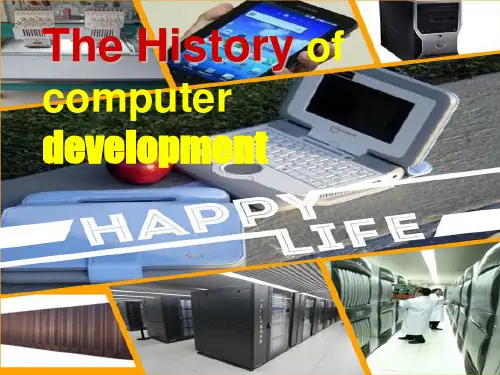

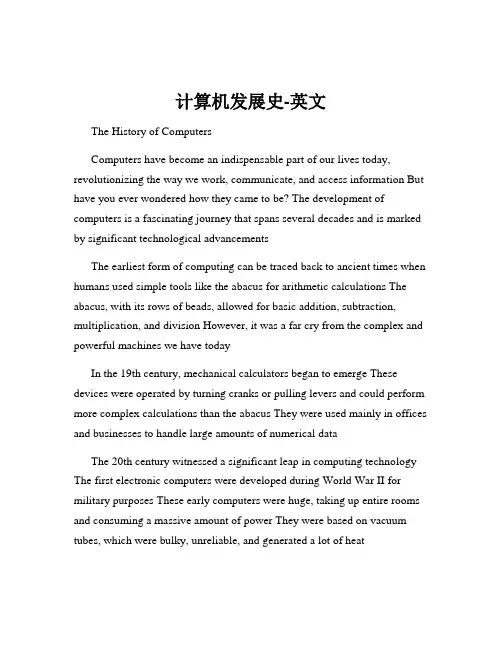
计算机发展史-英文The History of ComputersComputers have become an indispensable part of our lives today, revolutionizing the way we work, communicate, and access information But have you ever wondered how they came to be? The development of computers is a fascinating journey that spans several decades and is marked by significant technological advancementsThe earliest form of computing can be traced back to ancient times when humans used simple tools like the abacus for arithmetic calculations The abacus, with its rows of beads, allowed for basic addition, subtraction, multiplication, and division However, it was a far cry from the complex and powerful machines we have todayIn the 19th century, mechanical calculators began to emerge These devices were operated by turning cranks or pulling levers and could perform more complex calculations than the abacus They were used mainly in offices and businesses to handle large amounts of numerical dataThe 20th century witnessed a significant leap in computing technology The first electronic computers were developed during World War II for military purposes These early computers were huge, taking up entire rooms and consuming a massive amount of power They were based on vacuum tubes, which were bulky, unreliable, and generated a lot of heatOne of the most important milestones in the history of computers was the invention of the transistor in 1947、 Transistors replaced vacuum tubes and were much smaller, more reliable, and consumed less power This led to the development of smaller and more efficient computersIn the 1960s, integrated circuits were introduced, which further miniaturized the components of a computer This allowed for the creation of desktopsized computers that were more accessible to businesses and individualsThe 1970s saw the birth of the microprocessor, a single chip that contained the processing power of an entire computer This innovation made it possible to develop personal computers that were affordable and practical for home use Companies like Apple and IBM played a crucial role in bringing personal computers to the mainstreamThe 1980s and 1990s were marked by rapid advancements in software and operating systems Graphical user interfaces (GUI) made computers more userfriendly, and applications such as word processors, spreadsheets, and games became widely available The Internet also began to gain popularity during this time, connecting computers around the world and opening up a whole new realm of possibilitiesThe 21st century has brought about even more revolutionary changes Laptops, tablets, and smartphones have become ubiquitous, allowing us to carry computing power in our pockets and access information anytime, anywhere Cloud computing has enabled us to store and access data remotely, eliminating the need for large local storage devicesAdvancements in artificial intelligence and machine learning are also shaping the future of computing Computers are now able to perform tasks that once required human intelligence, such as image recognition, language translation, and autonomous drivingLooking back at the history of computers, it's clear that the progress has been nothing short of remarkable From the simple abacus to the supercomputers of today, the development of computing technology has transformed our world in ways that were once unimaginable And the journey is far from over As technology continues to evolve at an astonishing pace, we can only anticipate more exciting innovations and breakthroughs in the field of computing in the years to comeThe impact of computers on society has been profound They have changed the way we do business, communicate with each other, and access education and entertainment In the business world, computers have streamlined operations, increased productivity, and enabled global collaboration Online shopping, ecommerce, and digital marketing have become integral parts of the modern economyIn the field of communication, email, social media, and video conferencing have made it easier than ever to stay in touch with people around the world We can now communicate instantly and share information with a click of a buttonEducation has also been transformed by computers Online courses, educational software, and digital libraries have made learning more accessible and personalized Students can now access a vast amount of knowledge and resources from the comfort of their homesHowever, the rapid development of computers has also brought some challenges Issues such as cyber security, privacy concerns, and digital divide need to be addressed Cyber attacks and data breaches pose a threat to personal and corporate information The unequal access to technology and the digital skills gap are also issues that need to be overcome to ensure that the benefits of computing are shared by allIn conclusion, the history of computers is a story of continuous innovation and progress It is a field that has constantly pushed the boundaries of what is possible and has had a profound impact on every aspect of our lives As we look forward to the future, it is exciting to think about the new possibilities and challenges that lie ahead。
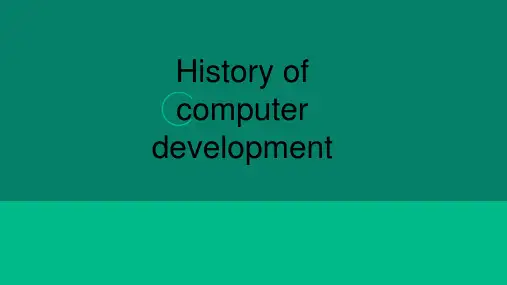
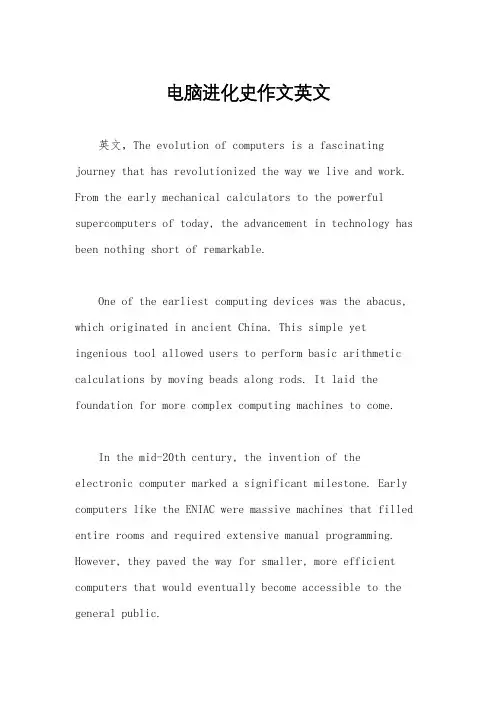
电脑进化史作文英文英文,The evolution of computers is a fascinating journey that has revolutionized the way we live and work. From the early mechanical calculators to the powerful supercomputers of today, the advancement in technology has been nothing short of remarkable.One of the earliest computing devices was the abacus, which originated in ancient China. This simple yet ingenious tool allowed users to perform basic arithmetic calculations by moving beads along rods. It laid the foundation for more complex computing machines to come.In the mid-20th century, the invention of the electronic computer marked a significant milestone. Early computers like the ENIAC were massive machines that filled entire rooms and required extensive manual programming. However, they paved the way for smaller, more efficient computers that would eventually become accessible to the general public.The introduction of the microprocessor in the 1970s revolutionized the computer industry. This tiny chip contained the central processing unit (CPU) of a computer, allowing for greater miniaturization and faster processing speeds. Companies like Intel and AMD became leaders in microprocessor development, driving innovation and competition in the market.The 1980s saw the rise of personal computers (PCs), thanks to pioneers like Apple and IBM. These user-friendly machines brought computing power into people's homes and offices, enabling individuals to perform tasks like word processing, gaming, and communication with ease. Phrases like "surfing the web" and "scrolling through social media" became commonplace as the internet became accessible to the masses.As technology continued to advance, computers became more powerful and portable. Laptops, tablets, and smartphones revolutionized the way we interact with information, allowing us to stay connected and productiveon the go. Terms like "cloud computing" and "artificial intelligence" entered our lexicon as computers became increasingly integrated into our daily lives.Looking ahead, the future of computing holds even more exciting possibilities. Quantum computers, which harness the principles of quantum mechanics, promise to revolutionize fields like cryptography, drug discovery, and weather forecasting. As technology continues to evolve, one thing is certain: the journey of computers has only just begun.中文,计算机的演变是一段迷人的旅程,彻底改变了我们的生活和工作方式。
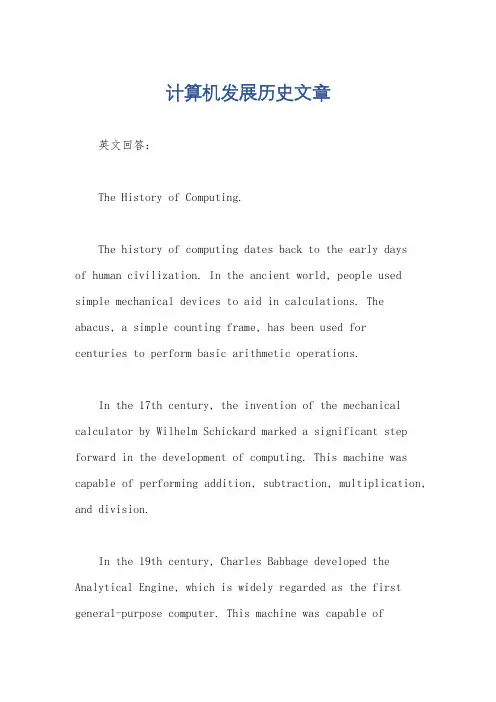
计算机发展历史文章英文回答:The History of Computing.The history of computing dates back to the early daysof human civilization. In the ancient world, people used simple mechanical devices to aid in calculations. The abacus, a simple counting frame, has been used forcenturies to perform basic arithmetic operations.In the 17th century, the invention of the mechanical calculator by Wilhelm Schickard marked a significant step forward in the development of computing. This machine was capable of performing addition, subtraction, multiplication, and division.In the 19th century, Charles Babbage developed the Analytical Engine, which is widely regarded as the first general-purpose computer. This machine was capable ofperforming a wide range of operations, including logical operations and conditional branching.In the early 20th century, the development ofelectronic computers began to accelerate. In 1943, the Atanasoff-Berry Computer became the first electronicdigital computer. This machine was followed by the ENIAC, which was the first electronic general-purpose computer.In the 1950s, the development of the transistor led to a significant reduction in the size and power consumption of computers. This made it possible to create smaller and more powerful computers.In the 1960s, the development of the integrated circuit led to a further reduction in the size and power consumption of computers. This made it possible to create even smaller and more powerful computers.In the 1970s, the development of the microprocessor led to the creation of the first personal computers. These computers were small enough and affordable enough to beused by individuals.In the 1980s, the development of the graphical user interface (GUI) made computers easier to use. This led to a significant increase in the popularity of personal computers.In the 1990s, the development of the internet led to a global network of computers. This made it possible to share information and resources across vast distances.In the 21st century, the development of cloud computing has led to a new era of computing. This technology allows users to access software and data from anywhere on the internet.The history of computing is a story of continuous innovation. From the simple abacus to the modern cloud computer, humans have constantly pushed the boundaries of what is possible with computing technology.中文回答:计算机发展史。
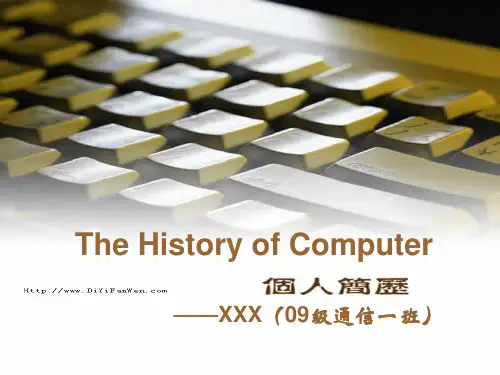
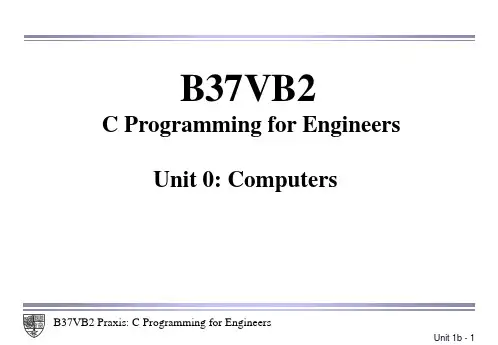
电脑发展史英文作文英文:Computer technology has come a long way since its inception in the mid-20th century. In the early days, computers were massive machines that took up entire rooms and were only accessible to a select few. However, with advancements in technology, computers have become smaller, faster, and more accessible to the general public.The first computers were developed in the 1940s and were used primarily for military purposes. These machines were massive and required a team of specialists to operate them. However, as technology improved, computers became smaller and more affordable. In the 1970s, the first personal computers were introduced, which allowed individuals to have a computer in their home or office.The 1980s saw a boom in the personal computer industry, with companies like Apple and IBM leading the way. Theintroduction of graphical user interfaces (GUIs) made computers more user-friendly and accessible to the general public. The 1990s saw the rise of the internet and theWorld Wide Web, which revolutionized the way people communicate and access information.Today, computers are an integral part of our daily lives. They are used for everything from communication to entertainment to business. Smartphones and tablets have made computers even more accessible, allowing people tostay connected no matter where they are.中文:自20世纪中期以来,计算机技术已经发展了很长一段路程。